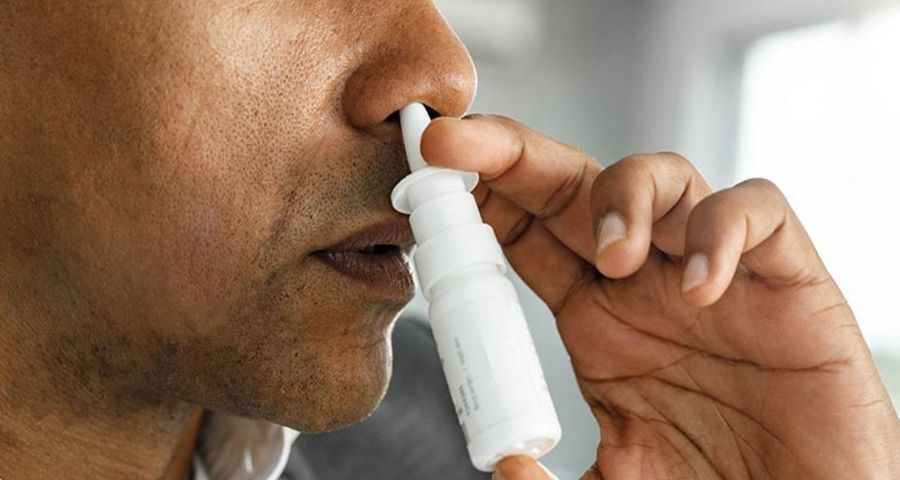GENERIC NAME: Dihydroergotamine Mesylate Nasal Spray
BRAND NAME(S): DHE-45® Injection, Migranal® Nasal Spray
DIHYDROERGOTAMINE MESYLATE: DESCRIPTION
Dihydroergotamine (DHE) belongs to a class of drugs called ergot alkaloids. Dihydroergotamine Mesylate is a nasal solution used to treat migraine headaches. It is not an ordinary pain reliever, which will not help relieve any type of pain other than throbbing headaches. You can buy this medicine only with your doctor’s prescription.
DOSAGE:
The dose of this medicine may vary person to person. Follow all directions written on the prescription label.
Each vial contains sufficient medication to relieve a single migraine attack. It is recommended not to use more than four sprays for a single migraine attack. For migraine headaches, the following nasal solution dosage can be taken:
Adults: One spray (0.5 mg) in each nostril. After 15 minutes, another spray (0.5 mg) in each nostril can be used.
Children: Use and dose must be determined by the doctor.
However, it is vital to ask the right dose before using this medicine.
DIHYDROERGOTAMINE MESYLATE SIDE EFFECTS:

Less Common or Rare Side Effects:
- Chest pain
- Irregular heartbeat
- Itching of the skin
- Feeling of heaviness in chest
- Weak or absent pulses in legs
- Cough, fever, sneezing, or sore throat
- Pain in arms, legs, or lower back
- Pale bluish-colored or cold hands or feet
- Shortness of breath or troubled breathing
- Pain in back, chest or left arm
- Numbness and tingling of face, fingers, or toes
More Common Side Effects:
- Diarrhea
- Dizziness
- Dry mouth
- Fatigue
- Headache
- Change in sense of taste
- Sore throat
- Sleepiness
- Increased sweating
- Nausea or vomiting
- Muscle stiffness
- Runny and stuffy nose
- Sudden sweating and feelings of warmth
- Sensation of burning, warmth, or heat
- Unexplained nose bleeds
- Unusual tiredness or weakness
- Burning or tingling sensation, dryness, soreness, or pain in the nose
Less Common Side Effects:
- Confusion
- Eye pain
- Fever
- Anxiety
- Blurred vision
- Muscle weakness
- Nervousness
- Congestion in chest
- Cough
- Decreased appetite
- Depression
- Cold clammy skin
- Difficulty swallowing
- Heartburn
- Increased watering of eyes
- Ear pain
- Increased watering of the mouth
- Increased yawning
- Stomach pain
- Pounding heartbeat
- Red or irritated eyes
- Ringing or buzzing in ears
- Skin rash
- Sudden fainting
- Trouble in sleeping
- Swelling of face, fingers, feet, or lower legs
- Unusual feeling of well being
- Pinpoint red spots on skin
- Trembling or shaking of hands or feet
- Dizziness or lightheadedness when getting up from a lying or sitting position
DIHYDROERGOTAMINE MESYLATE OVERDOSE SYMPTOMS:
Overdose symptoms of Dihydroergotamine Mesylate (Migranal Nasal Spray) include:
- Dizziness
- Confusion
- Seizures
- Nausea
- Headaches
- Slowed breathing
- Upset stomach
- Vomiting
- Fainting
- Blurred vision
- Coma
- Stomach pain
- Blue color in fingers and toes
- Numbness, tingling, and pain in fingers and toes
INTERACTIONS:
Some other drugs may interact with Dihydroergotamine and can impact the effectiveness of this medicine. Tell your doctor if you are using other medicines such as:
- Atazanavir
- Boceprevir
- Epinephrine
- Clarithromycin
- Amprenavir
- Cobicistat
- Cocaine
- Azithromycin
- Darunavir
- Delavirdine
- Almotriptan
- Dobutamine
- Dopamine
- Eletriptan
- Ephedrine
- Erythromycin
- Indinavir
- Dirithromycin
- Fosamprenavir
- Frovatriptan
- Lopinavir
- Idelalisib
- Itraconazole
- Josamycin
- Ketoconazole
- Nefazodone
- Letermovir
- Lidocaine
- Mepartricin
- Midodrine
- Saquinavir
- Mifepristone
- Miokamycin
- Naratriptan
- Norepinephrine
- Phenylephrine
- Telithromycin
- Phenylpropanolamine
- Rizatriptan
- Posaconazole
- Nelfinavir
- Propylhexedrine
- Spiramycin
- Pseudoephedrine
- Ritonavir
- Rokitamycin
- Roxithromycin
- Saralasin
- Sumatriptan
- Vasopressin
- Telaprevir
- Tipranavir
- Voriconazole
- Zolmitriptan
- Troleandomycin
Using this drug with any of the following medicines is usually not recommended, but may be required in some cases. If both medicines are prescribed by your doctor together, he may change the dose.
- Alefacept
- Conivaptan
- Belzutifan
- Enzalutamide
- Bromocriptine
- Ceritinib
- Lefamulin
- Crizotinib
- Dexfenfluramine
- Abametapir
- Mitotane
- Eluxadoline
- Erdafitinib
- Fluconazole
- Lumacaftor
- Netupitant
- Berotralstat
- Fosnetupitant
- Imatinib
- Voxelotor
- Lanreotide
- Lorlatinib
- Fluvoxamine
- Sibutramine
- Octreotide
- Pazopanib
- Propatyl Nitrate
- Ranolazine
- Tucatinib
- Selpercatinib
- Ribociclib
- Sotorasib
Using Migranal spray with any of the following medicines may increase the risk of certain health side effects. If both medicines are prescribed by your doctor together, he may change the dose of the medicines.
- Propranolol
- Nitroglycerin
Other Interactions
- Tobacco
- Alcohol
- Grapefruit Juice
STORAGE:
Store this medicine at room temperature, away from moisture, heat and direct light. Keep out of the reach of children. Do not keep outdated or expiry medicine or medicine no longer required.
PRECAUTIONS:
Before using Dihydroergotamine Mesylate nasal spray, tell your doctor or health care provider if you are allergic to it or if you have a history of any other allergies.
Before using Dihydroergotamine, tell your doctor about the medical history; especially of:
- Heart disease
- Stroke
- Kidney disease
- Liver disease
- High blood pressure (hypertension)
- Recent blood vessel surgery
- Nasal problems (such as chronic congestion, nasal allergies)
- A certain severe blood infection (sepsis)
- Bowel disease such as ischemic bowel syndrome
- Blood circulation disease such as Raynaud’s syndrome, peripheral arterial disease
- Headaches with unusual symptoms or certain types of headache (hemiplegic/basilar)
Tell your doctor if you use tobacco, alcohol and other illicit drugs.
It is not recommended to use this medicine during pregnancy. It may harm an unborn baby. If you are pregnant or planning to get pregnant, tell your doctor right away.
Dihydroergotamine passes into the breast milk and may harm a nursing infant. Tell your doctor if you’re breast-feeding.
RELATED ARTICLES:
- Adderall: Side Effects, Uses, Interaction and Precautions
- Tramadol Oral: Side Effects, Uses, Interaction and Overdose
- Metoprolol: Side Effects, Uses, Interaction and Precautions
- Amoxicillin: Side Effects, Uses, Interaction and Precautions
- What is Gabapentin? Its Side Effects, Uses, Interaction and Precautions
